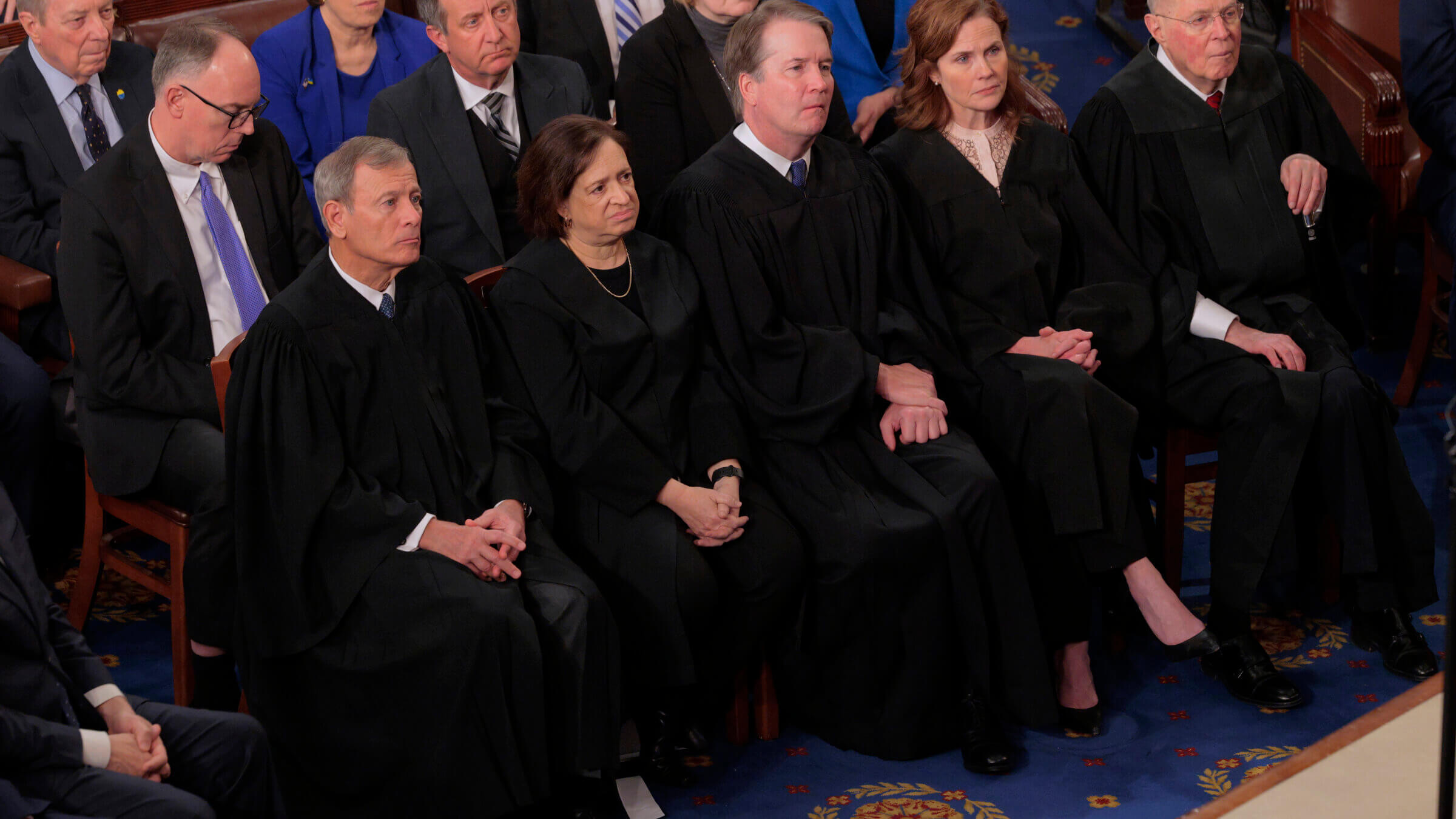John Roberts will not save us — but we might just able to save ourselves
Constitutional law scholar Leah Litman applies her strict scrutiny to what she sees as an increasingly ‘lawless’ Supreme Court

Chief Justice of the Supreme Court John Roberts, Justice Elena Kagan, Justice Brett Kavanaugh, Justice Amy Coney Barrett, and retired Justice Anthony Kennedy attend Donald Trump’s address to a joint session of Congress. Photo by Getty Images
One of the many virtues of Leah Litman’s lucid and blistering new book, Lawless: How the Supreme Court Runs on Conservative Grievance, Fringe Theories, and Bad Vibes is that it, as the title suggests, reads almost like a pulpy crime story. But unlike most whodunits, we know at the very start of Litman’s tale who dun the crime. No less unusual, Litman ends her story with what can be dun by Americans who wish to resist this state of lawlessness.
Litman is a professor of constitutional law at the University of Michigan, and co-host of the popular weekly legal podcast Strict Scrutiny, which subjects the decisions made by SCOTUS to scathing wit and surgical analysis. (In Litman’s wide-ranging criticism of SCOTUS, she lambastes the hypocrisy of the Republican-majority’s skepticism on abortion cases presented by Jewish plaintiffs who argue that their religious faith compels them to perform, provide, or access abortion care. As she notes, this skepticism is a decidedly unusual response from a court that is usually keen on expanding, not retracting, religious exemptions from law.)
When I spoke to Litman over Zoom, she expanded on the Roberts court’s cultural grievances, crackpot theories, and overall “bad vibes,” a term she says she uses to draw a distinction between “what some people think of as law,” i.e. “something that’s objective or determinate.” Instead, it becomes something based on feelings and what “triggers them and what upsets them,” which she sees as reflective of the “talking points and zeitgeist of the Republican Party.”
In our conversation, Litman traced the historical origins of bruised feelings and bad vibes that passes itself off as conservative jurisprudence. We can see today, she emphasized, a reaffirmation of the Lost Cause movement following the Civil War, “this firm commitment to restoring and entrenching white conservative political power and shutting out racial minorities from the political process and treating the inclusion of racial minorities in the polity as an affront to white conservatives and as a form of discrimination against white conservatives. And these same ideas seed, you know, the opposition to the modern Voting Rights Act.”
“Bad vibes” is, of course, not a term often found in the footnotes of law review articles. Yet while Litman acknowledged the term is kind of “loosey-goosey,” she sees it as the driving force behind SCOTUS’ legal reasoning. One of the many problems with vibes, Litman observed, is that “while everyone has feelings, my feelings don’t govern what other people can do. I am allowed to have feelings and views about the world. But that doesn’t mean I get to declare that everyone must make me feel good.”

In the case of the court’s conservative majority, Litman says, this means that they get to feel good about expressing their cultural and social grievances. They can, like Martha-Ann Alito, do so by, say, flying an upside-down American flag outside their house in support of the men and women who invaded the Capitol on Jan. 6. But, more importantly, they can also bring those grievances to their legal reasoning and turn our constitution upside down. (Something that Mrs. Alito’s husband has done time and again as one of our nation’s nine sages.)
Yet, though the Roberts Court — which Litman refers to in her book as “the guys (and Amy)” — might be consumed by grievance, they are not blind to the need to garb these bad vibes in the guise of theories. This is the case for originalism, a seemingly neutral method to decide cases based on a literal reading of the Constitution. Yet, the absence of any mention of women in our founding document has allowed the Supreme Court, even after the passing of the Fourteenth Amendment, to continue to deny equal rights to women.
Hence the importance of the recent overturning of Roe v. Wade. As Litman drily observed, originalism offers conservatives and reactionaries a way to speak about issues without acknowledging the actual stakes involved. It provides a kind of plausible denial from positions that, in effect, declare, “Yes, we should take away women’s birth control pills, force them to go through childbirth, and not allow them to get divorced.”
Meanwhile, as Litman remarked, the Roberts Court often dons the guise of another supposedly objective theory, institutionalism. Her critique is particularly unsettling for those of us who would like to think that Chief Justice John Roberts is an institutionalist who, like the deus ex machina in ancient Greek tragedy, will suddenly appear over the stage set and lift us free of our tragic and fatal predicament.
On one level, Litman said, “anyone looks like an institutionalist when compared to Clarence Thomas and Sam Alito. That John Roberts is more along the spectrum toward the median American voter than either of them is just obviously true and doesn’t tell us that much about whether John Roberts is actually a moderate or median. There are just so many examples where decisions by John Roberts have undermined our institutions and delegitimized our institutions.”
Consider all the decisions written or signed onto by Roberts on campaign financing, presidential powers, partisan gerrymandering, or voting rights to illustrate her claim. Clearly, Litman is not waiting for the Chief Justice to save us. “Look at all the things that Donald Trump is doing that defile our institutions and degrade our democracy. Those are things that John Roberts made perfectly clear that the president is constitutionally entitled to do. And there’s just nothing our lawmaking institutions like Congress or the federal courts can do about that,” she said.
What, then, are we to do? In her book, Litman urges the reader to “make them fight for their nihilism and obtain it at a cost.” In our conversation, she eagerly expanded on this call to action. The forces of democracy and decency cannot win this fight overnight, she told me. “There is no magic fix that will work. Instead, we need to make the case to our fellow citizens and our future elected leaders that in order to get ourselves out of this mess…and shore up our democracy so that we don’t run the risk of sliding back into autocracy and authoritarianism, we need to reform and democratize the Supreme Court.”
It is not what we might hope to hear, but it is the message we need to hear. In fact, as Albert Camus insisted, there is no reason for hope, but that is never a reason to despair. Or, as Litman concludes in her book, “the nihilistic take would be to throw up our hands and do nothing because it all seems too difficult. They’ve stolen a Court and they are practically daring anyone to challenge them. It’s time to call their bluff.”

















